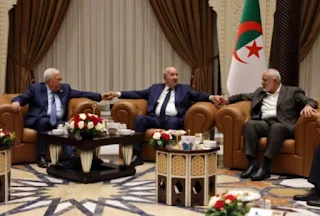
Syrian President Bashar al-Assad arrives in the UAE on a surprise official visit, and meets his Emirati counterpart, Mohammed bin Zayed Al Nahyan
Today, Sunday, Syrian President Bashar al-Assad arrived in the UAE on an official visit, where he met his Emirati counterpart, Mohammed bin Zayed Al Nahyan.
The Syrian presidency stated, in a statement, that President al-Assad arrived "this afternoon in the United Arab Emirates on an official visit, during which he is accompanied by First Lady Asma al-Assad."
She added, "He was received upon his arrival at the presidential airport in Abu Dhabi, Sheikh Mohammed bin Zayed Al Nahyan, President of the United Arab Emirates," noting that they went to the Al-Watan Palace in the capital, Abu Dhabi, to start the talks.
In turn, UAE President Mohamed bin Zayed said, "We held constructive talks with the Syrian president to support and develop brotherly relations for the benefit of the two countries."
"We are working to strengthen cooperation and coordination with Damascus on issues that serve stability and development," Mohammed bin Zayed added.
The delegation of the accompanying Syrian president included Minister of Economy and Foreign Trade Samer Khalil, Minister of Presidential Affairs Mansour Azzam, Minister of Information Boutros Hallaq, Assistant Foreign Minister Ayman Sousan, and Chargé d'Affaires of the Syrian Embassy in Abu Dhabi Ghassan Abbas.
It is noteworthy that the Emirati Foreign Minister, Abdullah bin Zayed Al Nahyan, visited the Syrian capital, Damascus, on the 12th of last February, in the first visit by a prominent foreign official, in the aftermath of the devastating earthquake that struck the north of the country on the 6th of the same month.



































































